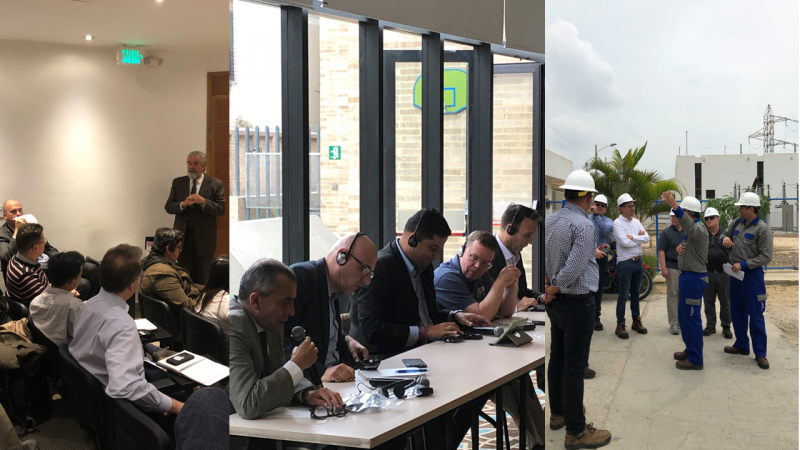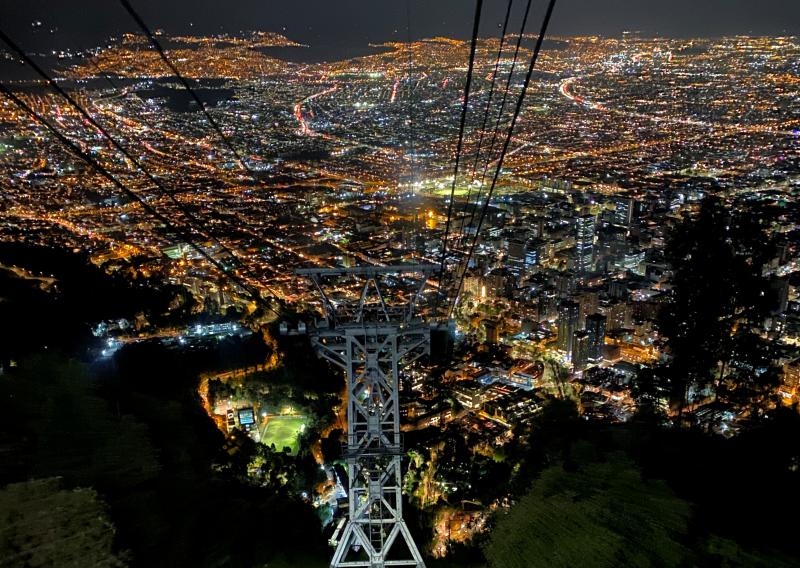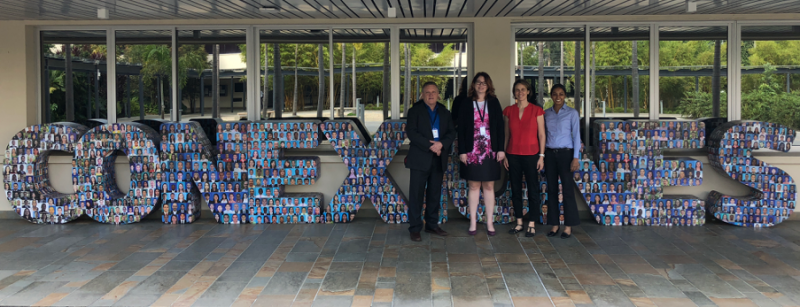Colombia

Due to recent drought years, and the falling prices of renewables, Colombian stakeholders, both within and outside of the government have become increasingly interested in incorporating renewable energy onto its grid while maintaining or improving system reliability and accommodating expected load growth. EUPP work in Colombia has been aimed at supporting Colombian efforts to achieve this goal. Capacity building activities focus on identifying needed changes in regulations, laws, internal procedures, and training, and technical assistance on forecasting, intra-day markets, reverse energy auctions, smart metering, distributed energy resources, microgrids for off-grid uses, and battery storage systems.
Colombia currently has 15 solar farms, 9 large-scale self-generation projects and more than 1,500 small-scale self-generation photovoltaic solar projects, which provide a peak capacity of 456.72 MW, but another 2.5 GW is projected to be connected by the end of 2023, and an additional 6 GW is in various stages of the project pipeline.
Offshore Wind Generation Resolution published
Following a series of workshops and discussions organized by USEA, Tetra Tech and NREL, the Colombian Ministry of Mines and Energy and the General Maritime Directorate (DIMAR) published a resolution on offshore wind permits:
- Resolution No.40284 of August 3, 2022, which defines the process by which those interested in developing offshore wind energy projects can obtain temporary permits on the maritime areas to be used by such projects and calls for the first round of allocations.
Geothermal Decrees Published
Following a series of workshops and discussions organized by USEA, Tetra Tech and NREL, the Colombian Ministry of Mines and Energy published 2 decrees regulating the production of electricity from geothermal sources:
- Decree 1318 of July 27, 2022, by which Decree 1073 of 2015, the Sole Regulatory Decree of the Administrative Sector of Mines and Energy is modified in order to regulate the articles 21 and 21-1 of Law 1715 of 2014 in relation to the development of activities oriented to the generation of electrical energy from geothermal sources
- Decree 40302 of August 5, 2022, by which the technical requirements that will govern the Geothermal Registry and the Permits for exploration and exploitation of the Geothermal Resource for electric power generation purposes are established.
Green and Blue Hydrogen Decree Published
Following a series of workshops and discussions organized by USEA, NREL and Tetra Tech, the Colombian Ministry of Mines and Energy published a decree regulating the production of green and blue hydrogen:
- Decree 1476 of August 2, 2022 By which articles 21 and 23 of Law 2099 of 2021 are regulated and which adds Title VII to Part 2 of Book 2 of Decree 1073 of 2015 to adopt provisions aimed at promoting innovation, research, production, storage, distribution and use of hydrogen.
Battery Storage RFP awarded
After multiple EUPP meetings, the Mining and Energy Planning Unit (UPME) released a request for proposal for the design, construction, operation, and maintenance of Colombia's first utility scale battery storage system and related transmission infrastructure in Barranquilla. The project, which must be able to deliver up to 45MWh over a minimum period of one hour and must include building a 110/34.5kV substation plus associated transmission and distribution lines, was awarded to Canadian Solar in July 2021. The project will reduce congestion and allow for more renewables to be integrated into the grid while maintaining reliability.
Colombia’s Grid Code Revised
During 4 weeks of visits by U.S. grid code experts to Colombian electricity market operator XM's headquarters, coordinated by USEA, these experts discussed XM's proposed revisions to Colombia's grid code, which in turn was reqested by CREG, the electricity-sector regulator, which was in the process of updating them to regulate the connection of variable renewable energy to the grid. XM made a number changes to their proposal as a result of these discussions. Final CREG regulations were significantly impacted by the XM proposal.
Successful Renewable Energy Auction Held Worth $2.2 Billion
EUPP worked with Colombia’s Energy Ministry on renewable energy auction rules. They held a successful auction in October 2019 that led to 2,250 MW of renewable projects worth $2.2 billion. MME ensured sufficient demand, a key recommendation of USAID and USEA’s EUPP, by requiring (in the national development plan) that all distribution utilities to purchase at least 10% renewable energy from the auction. In addition to stronger demand, this policy also resulted in higher purchase price offers. The 2250 MW of renewable energy awarded (partially through the renewable energy auctions, and partially through renewable energy reliability auctions) far exceeded the original goal.
Battery Storage Regulations Released
Following a USAID workshop organized by USEA with NREL and Tetra Tech on battery storage, Colombia’s regulatory body for the electricity sector, CREG, released preliminary regulations for using battery storage to relieve transmission congestion (CREG 098 of 2019).
COLOMBIA UTILITY PARTNERSHIP (2017-present)
EUPP works closely with the Colombian government to help advance their plans to incorporate renewable energy onto its grid. Capacity building activities in generation focus on training, and technical assistance on reverse energy auctions, distributed energy resources, microgrids for off-grid uses, and battery storage systems.
In 2020-21, EUPP helped impart an on-line course aimed at young professionals, mainly women, to enable them to develop the expertise they need to successfully support Colombia’s efforts to integrate the large amounts of variable renewable energy that are expected to come onto their grid over the next 2 years. Participants created action plans to present to their organizations that outlines changes that could assist their organization and the country as they integrate renewable energy.
IEEE certification was achieved by the 51 participants who successfully finished the course and presented an action plan.
Other EUPP training courses achieved the following results:
IEEE Certification in Distributed Energy Resources
Twenty people were certified by the IEEE in distributed energy resources after attending a one week EUPP technical training on the subject.
IEEE Certification in Battery Storage
Three people were certified by IEEE on battery storage after attending EUPP technical training on the subject.
COLOMBIA UTILITY PARTNERSHIP (2017-present)
Adding large amounts of renewable energy to the grid can impact system reliability and increase congestion on the transmission system in areas with large renewable resources. EUPP provides capacity building activities on identifying needed changes in regulations, laws, internal procedures, and training, and technical assistance on battery storage systems to reduce transmission congestion.
EUPP organized several activities in support of a pilot project to use battery storage to relieve transmission congestion around the city of Barranquilla, Colombia. Activities included a workshop on battery storage organized with the National Renewable Energy Laboratory (NREL), a site visit to Barranquilla to look at possible sites for the batteries and follow up meetings with U.S. experts to discuss the proposed pilot project.
Battery Storage RFP Released
After multiple EUPP meetings, the Mining and Energy Planning Unit (UPME) awarded a contract in 2021 for the design, construction, operation, and maintenance of Colombia's first utility scale battery storage system and related transmission infrastructure in Barranquilla. The project, which was awarded to Canadian Solar in July of 2021, must be able to deliver up to 45MWh over a minimum period of one hour and must include building a 110/34.5kV substation plus associated transmission and distribution lines. The project will reduce congestion and allow for more renewables to be integrated into the grid while maintaining reliability.
Transmission Congestion Plan for Barranquilla Released
Colombia’s Energy Planning Agency, UPME, released a call for proposals for a pilot project using battery storage to alleviate transmission congestion around Barranquilla, after attending USEA activities on the subject. USAID convened USEA, together with NREL and Tetra Tech to offer technical assistance. We organized 2 days of discussions with UPME and Colombia's system operator, XM, around a planned battery storage pilot. This was followed by a workshop aimed at a broader group of stakeholders, including CREG, the regulator, and the Ministry of Mines and Energy, among others, to discuss battery storage projects. Finally, a number of experts accompanied USAID to Barranquilla to examine the substations proposed as battery storage sites for suitability. USEA later brought a battery storage expert to UPME to discuss the proposal, which was extensively revised following the technical assistance.
USEA has supported a number of distribution-sector events, including sending speakers to the conferences of ASOCODIS, the distributor's membership organization,and SER, a membership organization which is more focused on renewable energy. DIstribution utiltiies have also participated in some of our workshops, including a week long technical assistance on DER, and a 3-day workship on Smart Meters and AMI. At the moment, a number of distributors, as well as an employee of SER, are participating in a one year online capacity-building course to strengthen the ability of the distributors, as well as other Colombian electricity-sector stakeholders, to successfully integrate variable renewable energy onto thier grid (see hyperlink to course presentations, above).
COLOMBIA UTILITY PARTNERSHIP (2017-present)
As Colombia’s electricity sector grows in complexity with the incorporation of increasing amounts of renewable energy, and with increasingly sophisticated products to provide needed flexibility, rules, regulations, and other safeguards must be developed to ensure and increase market transparency and competitiveness. An important part of these efforts is the recent establishment of an Independent Market Monitoring Unit for Electricity and Gas in the Superintendencia de Servicios Domiciliarios, Colombia’s watchdog of public services.
EUPP is working with USAID Colombia to help the Colombian government advance their plans to incorporate renewable energy through targeted capacity-building activities that identify needed changes in regulations laws, internal procedures, and training. These capacity-building efforts include organizing a series of webinars presented by independent market monitors throughout the world to help them better understand the role that Colombia’s market monitor is likely to play.
XM Reviews Current Policies to Integrate Distributed Energy Resources
XM created a list of possible initiatives to consider after an executive exchange to visit New York ISO, ISO New England, and FERC to discuss U.S. initiatives to integrate distributed energy resources.





